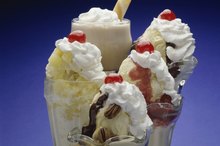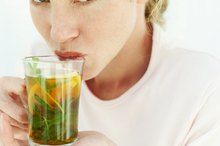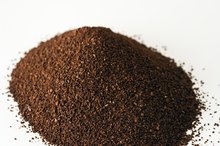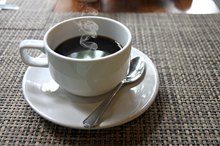What does fact checked mean?
At Healthfully, we strive to deliver objective content that is accurate and up-to-date. Our team periodically reviews articles in order to ensure content quality. The sources cited below consist of evidence from peer-reviewed journals, prominent medical organizations, academic associations, and government data.
- MayoClinic.com: Caffeine Content for Coffee, Tea, Soda and More
- MayoClinic.com: Caffeine- How Much is Too Much
- American Heart Association: Caffeine and Cardiovascular Disease
The information contained on this site is for informational purposes only, and should not be used as a substitute for the advice of a professional health care provider. Please check with the appropriate physician regarding health questions and concerns. Although we strive to deliver accurate and up-to-date information, no guarantee to that effect is made.
Caffeine in Tea and Soda
Caffeine is a natural stimulant found in a wide range of foods and drinks including coffee, tea, soda and chocolate 1. While tea and soda do not contain as much caffeine as coffee, they still have enough to cause physiological effects on the body 1. Moderate consumption of caffeinated beverages appears to be harmless, but excess caffeine may cause health problems 2.
Effects
Many people drink beverages with caffeine, including tea and soda, because they boost energy, at least for a short while. Caffeine can help you stay awake, although too much of it may keep you awake past the point at which you are ready to finally get to sleep 3. Another effect of caffeine is that it acts as a diuretic, causing the kidneys to release more water and making you urinate more frequently. Caffeine also causes your fatty tissue to release free fatty acids into the bloodstream.
- Many people drink beverages with caffeine, including tea and soda, because they boost energy, at least for a short while.
- Caffeine can help you stay awake, although too much of it may keep you awake past the point at which you are ready to finally get to sleep 3.
Amounts in Tea
Does Drinking Soda Cause Water Retention?
Learn More
Regular black tea contains 40 to 120 mg of caffeine in 8 oz of tea, while decaffeinated black tea has only 2 to 10 mg per 8-oz cup. A 6-oz cup of hot green tea contains about 26 mg of caffeine. One tbsp of generic mix to make iced tea contains 27 mg of caffeine, while the decaffeinated version has only 1 mg. Commercial bottled iced teas contain 15 to 27 mg of caffeine in a 12 or 16-oz can or bottle.
Amounts in Soda
The caffeine content in colas ranges between 35 to 38 mg per 12-oz can. Lemon-lime sodas are typically free of caffeine. Some diet sodas contain up to 47 mg per 12-oz can. A 12-oz can of some specialty sodas may contain up to 71 mg.
- The caffeine content in colas ranges between 35 to 38 mg per 12-oz can.
- A 12-oz can of some specialty sodas may contain up to 71 mg.
Concerns
Caffeine Free Soft Drinks
Learn More
People who consume more than 500 to 600 mg of caffeine a day may experience symptoms of nervousness, insomnia, irritability, restlessness, nausea, muscle tremors, headaches, anxiety and a racing heart. If you often drink beverages containing high levels of caffeine, you may experience withdrawal symptoms, especially headaches, when you try to cut back or stop. Withdrawal symptoms typically begin within 12 to 24 hours after the last time you consumed caffeine.
Special Circumstances
Women who are pregnant or planning on becoming pregnant should limit caffeine intake to under 200 mg per day. More caffeine than this may increase the risk of miscarriage and may cause fertility problems. A single cup of tea or soda will generally be far below this limit. Children should consume no more than 85 mg of caffeine each day. Some people are more susceptible to the effects of caffeine than others and may need to limit their consumption even more.
- Women who are pregnant or planning on becoming pregnant should limit caffeine intake to under 200 mg per day.
Related Articles
References
- MayoClinic.com: Caffeine Content for Coffee, Tea, Soda and More
- Kids Health: Caffeine Confusion
- MayoClinic.com: Caffeine- How Much is Too Much
- American Heart Association: Caffeine and Cardiovascular Disease
- Meredith SE, Juliano LM, Hughes JR, Griffiths RR. Caffeine Use Disorder: A Comprehensive Review and Research Agenda. J Caffeine Res. 2013;3(3):114-130. doi:10.1089/jcr.2013.0016
- Richards G, Smith AP. A Review of Energy Drinks and Mental Health, with a Focus on Stress, Anxiety, and Depression. J Caffeine Res. 2016;6(2):49-63. doi:10.1089/jcr.2015.0033
- Brunyé TT, Mahoney CR, Rapp DN, Ditman T, Taylor HA. Caffeine enhances real-world language processing: evidence from a proofreading task. J Exp Psychol Appl. 2012;18(1):95-108. doi:10.1037/a0025851
- Koppelstaetter F, Poeppel TD, Siedentopf CM, et al. Caffeine and cognition in functional magnetic resonance imaging. J Alzheimers Dis. 2010;20 Suppl 1:S71-84. doi:10.3233/JAD-2010-1417
- Harrell PT, Juliano LM. Caffeine expectancies influence the subjective and behavioral effects of caffeine. Psychopharmacology (Berl). 2009;207(2):335-42. doi:10.1007/s00213-009-1658-5
- Lucas M, O'reilly EJ, Pan A, et al. Coffee, caffeine, and risk of completed suicide: results from three prospective cohorts of American adults. World J Biol Psychiatry. 2014;15(5):377-86. doi:10.3109/15622975.2013.795243
- Abdel-Hady H, Nasef N, Shabaan AE, Nour I. Caffeine therapy in preterm infants. World J Clin Pediatr. 2015;4(4):81-93. doi:10.5409/wjcp.v4.i4.81
- American Psychiatric Association. Diagnostic and Statistical Manual of Mental Disorders. 5th edition. Washington DC; 2013.
- Turnbull D, Rodricks JV, Mariano GF, Chowdhury F. Caffeine and cardiovascular health. Regul Toxicol Pharmacol. 2017;89:165-185. doi:10.1016/j.yrtph.2017.07.025
- Centers for Disease Control and Prevention. Alcohol and Caffeine. Updated October 23, 2018.
- Alsunni AA. Energy Drink Consumption: Beneficial and Adverse Health Effects. Int J Health Sci (Qassim). 2015;9(4):468-474.
- Lyngsø J, Ramlau-Hansen CH, Bay B, Ingerslev HJ, Hulman A, Kesmodel US. Association between coffee or caffeine consumption and fecundity and fertility: a systematic review and dose-response meta-analysis. Clin Epidemiol. 2017;9:699-719. doi:10.2147/CLEP.S146496
- U.S. Food and Drug Administration. Pure and Highly Concentrated Caffeine. Updated September 21, 2018.
- National Institute on Drug Abuse. Drugs, Brains, and Behavior: The Science of Addiction. Updated July 2018.
Writer Bio
Bridget Coila specializes in health, nutrition, pregnancy, pet and parenting topics. Her articles have appeared in Oxygen, American Fitness and on various websites. Coila has a Bachelor of Science in cell and molecular biology from the University of Cincinnati and more than 10 years of medical research experience.









